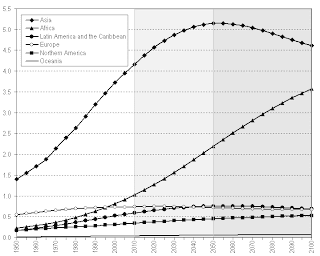 |
| The ideal family is no longer big |
The good news is that populations are actually stabilizing. We doubled global population between 1960-1990 – but this will most likely never happen again.
In all major rich countries – with the USA as a remarkable exception – population is stabilized or would even fall were it not for immigration. In many other countries birth rates have plummeted. Remains a number of poor countries with still very rapid rates – just come home from East Africa which is one of the regions with still increasing population. It is worth noting that population growth rates in Africa are still not as rapid as they have been in Asia.
 |
| http://esa.un.org/unpd/wpp/Analytical-Figures/htm/fig_2.htm |
The era of colonization of the globe of human kind is rapidly coming to a close, with nature resources sucked up and population now filling space after space. With this closing, our economic system is also bound to change.
Capitalism as we know it can’t manage a steady-state economy and it has also big problems to work with a stable population as things look like. After all, growth is the lifeblood of economic system and in that sense it probably doesn’t matter much if the growth is from increased consumption per capita or by increased population.
Perhaps "Peak child", "Peak oil" and "Peak soil" don't spell the end of capitalism, but they at least form "Peak capitalism".
This comment has been removed by a blog administrator.
ReplyDelete"In all major rich countries – with the USA as a remarkable exception – population is stabilized or would even fall were it not for immigration".
ReplyDeleteIn Australia immigration does add a lot of growth to the country, although if you exclude immigration Australia's population would still be growing not stabilizing or declining. 150,000 people a year are added from natural increase and 228,000 people a year from immigration.
Excluding immigration, most rich countries populations are still growing.